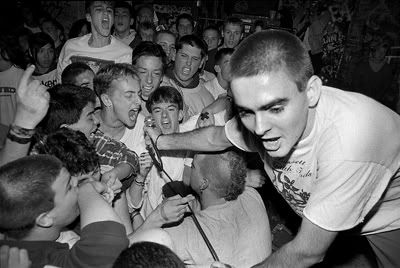
Insted at CBGB's, Civ with the sing along, Photo: Jeff Ladd
One of the really cool things about doing DCXX is that people have started to float us some great content that we had been searching for ourselves. One interview we were planning to do was with INSTED...and then out of the blue, we get an email from Ryan "Ditch" Donahue, who did a recent huge interview with Rich and Steve INSTED for his blog Activated! Now writing for teamgoon.com, Ryan thought we would give the interview a proper home. We couldn't agree more, much thanks to Ryan! "There's Nothing Like It..." -Gordo DCXX
Insted emerged in the mid 1980's as an Orange County hardcore band, taking cues from bands such as Uniform Choice, Minor Threat, and 7 Seconds. Their music took a PMA charged approach to hardcore, mixing melodic undertones with a speedy delivery and lyrics which reflected an idealistic conviction to living a constructive lifestyle.
The following interview was conducted on October 3, 2007 in Huntington Beach, California with Steve and Rich of Insted/The Alligators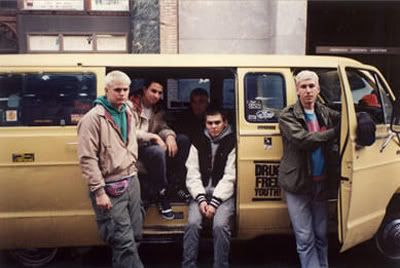
Describe Orange County hardcore in the mid to late 1980's.
Steve:
It was violent. It was exciting. It was a wide array of things actually. Those are the things that come to mind. All the bands were really good. Everybody came to. . . not necessarily Orange County to play. We had the Flash Dance but to me I was always going to Fender's Ballroom because any time that I went there was always good bands playing. Rich what other adjectives can you come up with?
Rich:
Fender's was kind of the border of the L.A. and Orange County scenes so you got the L.A. and the O.C. crowd coming. It was kind of like that was what we had.
Steve:
Flash Dance was so short lived.
Rich:
Yeah for like a year or two it held (shows). It was a small venue. It held some local shows. Some great shows were there.
Steve:
But for the most part you'd have like one or two shows at a VFW hall or at a skate rink or something like that but there wasn't a lot of places to play so you had to go up to L.A. or go somewhere else to find the shows. . . Orange County sort of living up to its conservative ways, you'd have a show and they'd be like "Never again. You can never rent this hall again." So for the most part things were pretty much going on at Fender's Ballroom or the Olympic Auditorium in L.A.
The bands. . . Let's see, about '85 the king of the hill was Uniform Choice, Doggy Style, and for Orange County the Adolescents and Social Distortion had already kinda broken up. . . went through a different phase, things like that. Those were kinda like the kings of the early 80's and yknow the Vandals.
Rich:
Yeah stuff like that. Touring bands would come through all of the time.
Steve:
For me and I can really only speak for myself Uniform Choice really got me to look at the faster, thrashier hardcore. I was listening to Rodney on the ROQ and I had an older friend who got me into the punk stuff like the Dead Kennedys. . . Stuff like that which I loved. But when Uniform Choice came on and they really started coming on strong. I saw that and it was almost frightening but it frightened me in a good way. So I really started to take more note on who was influencing them and started to get involved in that. Definitely I also was really into English punk at the time. . . GBH and the Varukers and stuff like that. So I was broadening my horizons for lack of a better term.
How did Insted come together at that time?
Steve:
Insted primarily came together from the ashes of like this band that was almost a party band. And when I say that - it was a punk band but we did a lot of punk covers of songs that we liked. I was learning how to play around which is generally how punk bands started. They didn't know how to play their instruments very well. At the time we were all discovering Stalag 13, 7 Seconds and Youth of Today, Uniform Choice, all of those things. And so (we were saying) "Wow..." we were really into Social Distortion and the Adolescents and stuff like that. . . Even English Dogs and that sort of thing.
And so essentially out of the ashes of this band, a bunch of us guys who all went to high school together, we started Insted. Kevin had nothing to do with that. As I was saying we were doing a lot of covers and one of the songs that we did was "Donut Shop Rock" by Doggy Style and Kevin would always be at the parties we played at and he would always take the mic and do that song with us. It was a different vibe and everything would change the moment he picked up the mic. (Kevin) was charismatic and people liked him; they liked being around him and it changed our style as players as well because all of a sudden we weren't just background music to some kegger party or something with a bunch of people pretending to be punks and slamming.
So here comes Kevin and it becomes "Hey this is pretty cool. We're all into the same stuff. We should start writing our own material," and we started going more towards what we were influenced by at the moment which was Stalag 13, 7 Seconds, Uniform Choice, etc.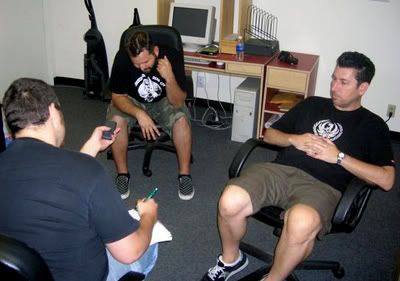
Ditch, Steve and Rich at the Merch.com office
So Rich how did you get involved with Insted?
Rich:
Going to shows and being a part of the scene I met Kevin. I was doing some scene report stuff for zines. I was at all the shows and he (Kevin) gave me a demo. Somehow we got to talking and we got each other's phone numbers. He sort of mentioned to me that they were going through some tough times within the band, trying to get to the next level and they didn't have a bass player. I told them I played bass so he sent me their stuff and I said "I'll try out" and I just ended up joining the band.
Steve:
We didn't try out anyone after Rich. We weren't looking for some hot shot bass player but what we did know about Rich was exactly what he said and that was that he was involved with the scene. He was doing scene reports and I mean he was everywhere. I would be at a show in San Francisco and there was Rich. I didn't know Rich but I knew Rich from shows.
So he came down to "try out for the band" for lack of a better term and he knew all of the songs. He put in the time and he was a guy that was involved in hardcore and that was very important to us.
And to his point where he was talking about Insted going through member changes that was because we started playing and I don't know at what point you started taking notice of us, Rich but it happened very quickly. It was just like we popped the gates and "Boom!" everyone was interested in what was going on with us. It caught us off guard and and then more importantly a couple of the guys that were in the band were still treating it like a party band. They didn't step up and they didn't want to tour, they didn't want to go out of town to play shows, and things like that. And because we were seeing all of these touring bands coming through and they were influencing us, Kevin and I, as opposed to the other guys, were more involved in the hardcore scene where they were at arms length of it. They liked punk and hardcore but they didn't mix themselves in it.
So it was almost like a weekend thing for them almost?
Steve:
Right. And that's not saying anything against them. It's just that's the way that they were involved with it. They surfed and did other things, whereas for Kev and I. . . that was like our bread and butter. That was what we liked. We went to shows and we wanted to see the chaos and craziness and what new band was coming out. Kevin was a big avid record collector and I would never call myself a collector but I was definitely buying a lot of records at that time.
What sort of bands were you playing with at that time?
Steve:
Well everybody. We played with such a wide variety of bands which is what is different about (hardcore) right now I think. We played with everybody.
Rich:
We'd just put on a punk show. It was whoever was around, whoever was touring. It could be Bad Brains, it could be MDC, Agnostic Front, Excel, ya know, a speed metal band.
Steve:
Anybody who was a band at that time we played with. It's just the way things were back then. Not to get on a soap box but now shows are really segregated. Straight edge bands play straight edge shows and on top of that there's separation in straight edge bands. It's weird where Rich and I and Kevin especially weren't particular. We just liked all kinds of punk and hardcore it was natural for us to play with those bands and furthermore I don't think it was ever discussed like "Why don't we put together a straight edge show together?"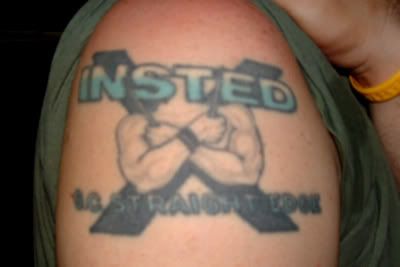
Steve's Insted O.C. Straight Edge tattoo, Photo: Tim DCXX
At the same time that you came up there were bands like Verbal Assault, Youth Of Today, and Gorilla Biscuits. Were you in correspondence with the straight edge bands on the East Coast?
Steve:
We were good friends with all of those bands who you just mentioned except maybe Verbal Assault who we were sort of more just aquaintences with. We knew Youth of Today from when they came out here. We played some San Francisco and Arizona area shows with them. They sort of in their own way took us under their wings because they were definitely a bigger band than us.
Rich:
Gorilla Biscuits were affiliated with Youth of Today and so we knew them and toured with them. When I think of Gorilla Biscuits we were like doing the same things. They were the East Coast and we were the West Coast. We had the same type of vibe too. It was like Youth Of Today came before Gorilla Biscuits while we had Uniform Choice over here (before Insted).
When you put out "Bonds of Friendship" was that sort of a big deal since you were so influenced by Uniform Choice or was working with Pat Dubar sort of just like working with anyone else who was involved in Orange County hardcore?
Steve:
It was definitely a big deal. It was a big deal that anybody wanted to do a record with us. And then it was a big deal because Youth of Today and Uniform Choice were both on the label and (those were) for me two of the big influential bands at the moment. And it was local and it was guys we knew and respected. Being seventeen years old and having someone tell you they wanted to put out your record is definitely a big ego boost.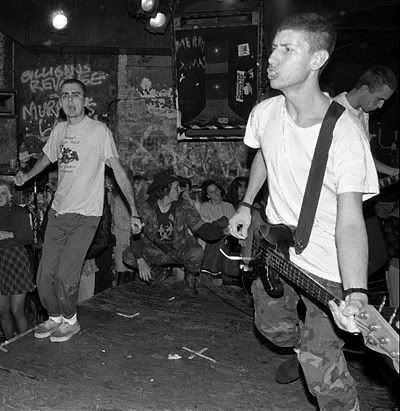
Kevin and Rich hit the CB's stage, Photo: Jeff Ladd
You guys in the song "Feel their Pain" talked about vegetarianism and then later on in "One World" there were sort of some environmental undertones. Was that a shared passion within the band or was that more of just Kevin's thing?
Rich:
It was shared.
Steve:
Yeah absolutely it was shared.
Rich:
Vegetarianism at the time that we wrote that song was a new thing for everyone for the most part and it's still something that we support to this day. We've never been ones to be super activist about anything but it's something that we believed in for sure.
Steve:
Definitely and I think anybody that knows the band (knows) we were never a preachy band. I would almost call us a fringe straight edge band even. Though we were a straight edge band it wasn't really intended that way. I think it evolved into that. It was definitely a belief in our system and everybody was on board with it but it wasn't important to just jam it down people's throats. And the same thing can be said with the whole vegetarian thing. When I think of Insted I think the whole philosophy was sort of "choose for yourself." Live and let live. Let people be who they are. It's ok to be different.
Rich:
And with the "One World" thing that was an issue at the time and it's still and issue today. I think both of them are probably even more relevant today than they were back then. I think there's more vegetarians in the world now, there's more people looking at the environment saying, "We'd better slow down or we're going to have nothing left to live on."
Steve:
It's a whole lot easier to be a vegetarian now than it was in the 1980s.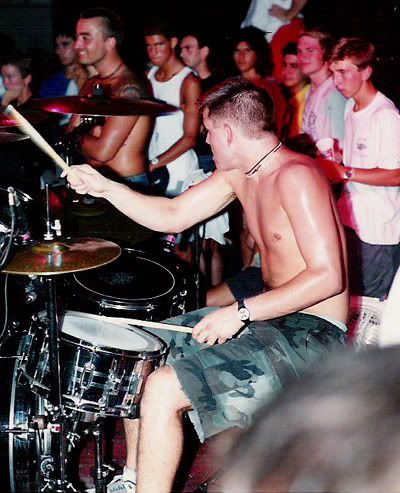
Steve rocks the III's, camos and an X Rated at Fenders
Did you guys get much heat for taking stands like being a straight edge band and singing songs about vegetarianism?
Steve:
At one point we were a relatively big band and with that people backlash just because we're on Epitaph and play to one thousand people a night. All of a sudden we've sold out or whatever.
Rich:
I think that we got away pretty good. We'd always kind of known bands that were around at the time. We were friends with everybody in the scene. There were bands that were hated. There were bands that hated other bands. We kinda slid through it. We were pretty much friends with a lot of people.
Steve:
We were conscious enough not to take sides in situations but to your point about controversial issues of the day like straight edge and vegetarianism there was a certain small group of people that wrote us off because we were friends with bands like Uniform Choice and Youth of Today. And then there was a small group of people who thought that we were "ultra posi," too positive or too uplifting for what was going on and that this (punk/hardcore) was not the type of music for this (attitude).
What sort of changes have you seen in terms of hardcore and straight edge since the 1980's?
Rich:
I think in the 80's you had sort of punk being the umbrella and then you had the peace punks, the skaters, the skinheads, the straight edge kids and all of that stuff. And it was all just kind of like a zoo; they were all sort of different animals but they all lived together. It eventually started becoming more strict and divided. I think over the years the music has also changed stylistically, like if someone says "We're hardcore" or "We're straight edge" it might not sound anything like Insted. A hardcore band today might be what I consider a crossover metal band or a glam rock band.
And with straight edge there's all of these little elements attached like, "You can't go out past 6:00 at night." There's these crazy little things. I mean I don't know because I haven't kept up on the whole thing but I can definitely say that it's changed and each generation sort of applies its own things to it. I know it still exists and I think it's a great thing to a certain extent.
Steve:
I can just say that it's changed. I do know that. I can't say that it's changed for the better or the worse; it's just different. When you go through and you look at hardcore bands and punk bands generally what's motivated them is whatever is going on politically and economically in the world or sort of whatever region that they are from so what motivated us back then is not the same thing that is motivating hardcore bands today. That's why hardcore from 1982 sounds a little bit different from hardcore in 1985 and a little bit different from hardcore from 1988 and so on. I just think that there's different social elements that drive the issue and I think one of the things that I notice mostly right now is that you go to a show and the musicians are a lot better and they're good at playing their instruments which is kinda weird, being like, "Wow look at you."
Rich:
And they're spending five grand to make an album rather than five hundred so their records are sounding better.
Steve:
Rich and I talk about this every once in a while sort of on the subject/off the subject. (In the 80's) when we'd roll into town and couldn't find the club we'd just find a punk kid and ask "Hey, where's the show tonight?" and he'd tell us where it is. Now with the entrance of Hot Topic and things like that sort of everyone looks like a punker to me and I don't know what to do. I mean if you're wearing sort of an obscure t-shirt like a BL'AST shirt or a Bad Reaction shirt (gesturing to Ditch and Mitch) chances are you're pretty committed to hardcore but outside of that if you're wearing a Dead Kennedys shirt you may not even know one song.
Part 2 coming soon with discussion about Insted's break up, their reunion, and much more.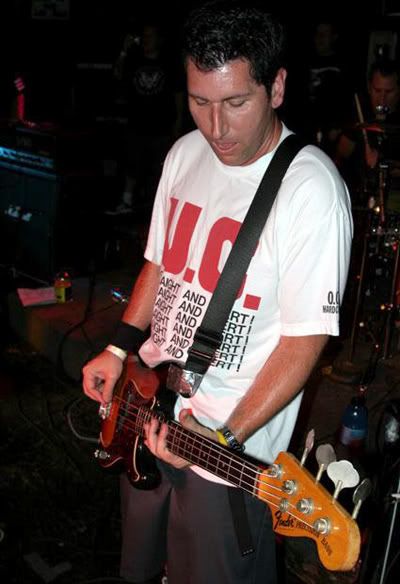
Rich in 2004, still straight edge and showing his love for U.C.
Tuesday, December 23, 2008
Steve and Rich of INSTED
Subscribe to:
Post Comments (Atom)

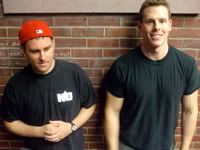
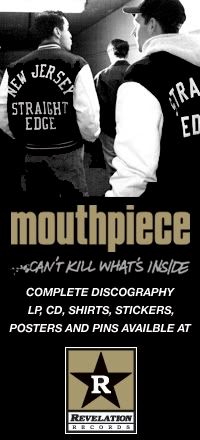
8 comments:
Great interview! Looking forward to part 2. Insted has always been one of my fave bands and was in fact the first sXe band I ever went to see at Gilman St. It was after they put out the 'We'll Make The Difference' 7". They were awesome, super tight and way fun. One of the best bands ever!
Nice words about Feel Their Pain. At the 2004 gig in NYC I had planned to just hang out on the side during Insted but after they busted into that song I found myself diving out into the crowd. They were pretty good that night.
Larson is one of the greatest guys ever. Hands down. Great interview.
Insted were so incredible. Thanks so much for the interview; a nice early xmas present!
This was a good read. Having been around pretty much from the start of the band, reading this stirred up a lot of old memories. Steve and Rich ARE two of the coolest, down to earth dudes you'll ever meet. The only bad thing is I don't see them enough...even though we live in the SAME county! I'm lookig forward to part two!
The part they mention about the different types of bands that used to play together compared to now is way too true. I think my second show ever (I was 13) was the 2nd Fender's riot show. The line-up was insane: Nation's On Fire, Insted, Don't No, Agression, DI, and MDC!!! Everyone got along just fine until during Insted the cops and Fire showed up, then the riot. Another show Insted played was also at Fender's, with Hard Stance, Blast, Adolescents and Uniform Choice!!! Insted were so energetic and positive and almost too straight compared to the other bands, but it didn't matter back then, bands just played and everyone rocked.
(I can't F-ing believe I still have these flyers)
Ok not everyone got along, but at least it was always everyone against the cops!!
Steve is one of my favorite guys in hardcore, and from the few times I've spoken with Rich, I'd say he's pretty swell too. Ditch (the interviewer) is from the Merrimack Valley, MA, and he's pretty rad too. Okay, enough ass kissing for the day.
Post a Comment